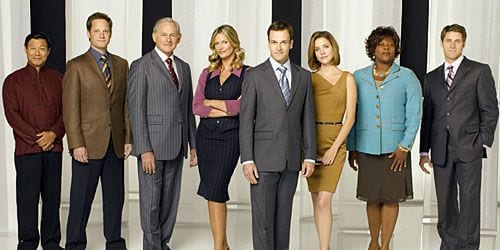
…and then I heard the music.
— Eli Stone (Jonny Lee Miller)
A successful lawyer at a top firm in San Francisco, Eli Stone (Jonny Lee Miller) believes he has everything — “Armani, accessories, and ambition.” But he’s thrust into turmoil one day when he begins to hear snippets of music no one else can hear. The culmination of these musical interludes comes while he’s making love to his fiancée, Taylor (Natasha Henstridge). No longer able to ignore the sounds, he interrupts the tryst and ventures into his living room to find George Michael singing “Faith.”
This was the first step in Eli’s moral education and the foundation of ABC’s idiosyncratic dramedy, Eli Stone. He will come to see that while Armani and accessories are nice, he must achieve more in order to become the man his father (Tom Cavanagh) wanted him to be. This other sort of ambition, Eli discovered in the series premiere last week, isn’t premised on social standing and greed, but by a desire to do what is just. That this story has been told countless times before could lead one to believe that Eli Stone will be trite, but it’s surprisingly fresh, taking viewers on a wild ride from laugh-out-loud humor to lump-in-the-throat sentimentality.
While Eli was inclined to disregard his first vision of Michael as an aberration, he was soon inconvenienced by another sighting, when the singer turned up at the law office, performing a very special concert that only Eli could hear. When a trolley car appeared in the lobby, followed by a vision of Eli himself climbing a mountaintop, the young professional decided to seek help.
In Eli’s search for understanding, the series initially teetered toward a somber tone: his neurologist brother Nathan (Matt Letscher) reported Eli had an inoperable brain aneurysm. Additionally, Eli learned that his father, long perceived as “drunk” and aimless, suffered the same condition. A second answer came from Dr. Chen (James Saito), an acupuncturist to whom Eli is referred by his secretary Patty (deliciously funny Loretta Devine). Chen viewed the visions as metaphysical messages with hidden meanings, and it appears that he was right. The song “Faith,” Eli remembered, was playing when he lost his virginity, and a trolley car was involved in an important father-son discussion.
Eli’s efforts to decipher the messages lead him onto his new path. The George Michael song allowed him to recognize Beth (Laura Benanti), who tried to hire Eli to sue a pharmaceutical company on behalf of her autistic son, as the girl to whom he lost his virginity. Likewise, the conversation on the trolley car reminded Eli of two things, that his father had great hopes for him, and that he was supposed to spread his father’s ashes from a mountaintop in India his father saw on a postcard.
Eli’s realizations alienated some of those closest to him, particularly his boss and future father-in-law, Jordan Wethersby (Victor Garber, repeating his performance in Justice), and Taylor, who dumped him upon learning of his medical condition. Although the couple reunited by the premiere episode’s end, Beth has been plainly established as the more appropriate choice.
Eli Stone deals with weighty issues — the purpose of life, the inevitability of death, and corporate liability — but all of it is infused with levity. When Eli met Beth’s son, he wondered aloud if the child was his, to which she dryly responded, “Yeah… I was pregnant for eight years.” Even the sage Dr. Chen provided comic relief, revealing that he is a Western philosophy student who adopted an Eastern accent and demeanor to appeal to customers. Such humor emphasizes one of the key lessons Eli must learn: success is measured by the joy one creates, both professionally and personally. Still, the show doesn’t sidestep pain. When Eli traveled to India, his speech before he poured his father’s ashes into the wind had his mountain guides in tears — and the shot of the tattered postcard sticking out of Eli’s bag likely had many viewers in the same state.
Along with Pushing Daisies and Reaper, Eli Stone reveals that the much-lamented demise of the sitcom may not be so terrible. Television comedy lives on in these dramas that look at life in a skewed manner.

![Call for Papers: All Things Reconsidered [MUSIC] May-August 2024](https://www.popmatters.com/wp-content/uploads/2024/04/all-things-reconsidered-call-music-may-2024-720x380.jpg)



